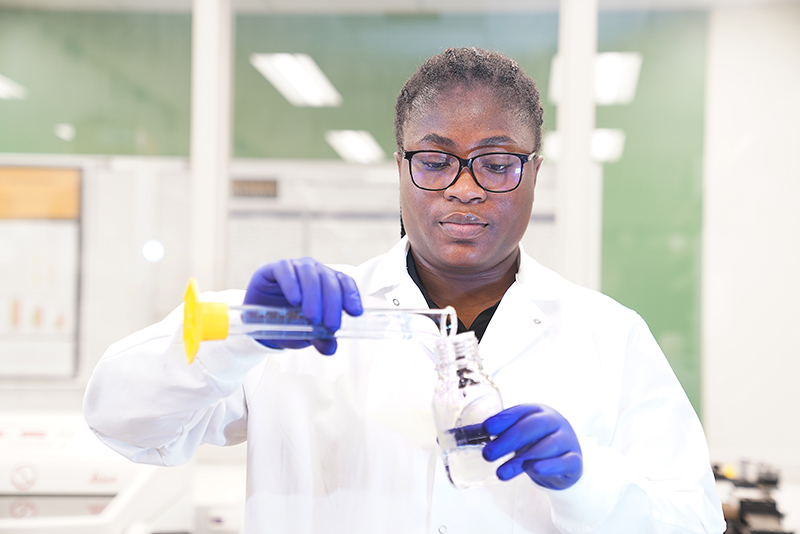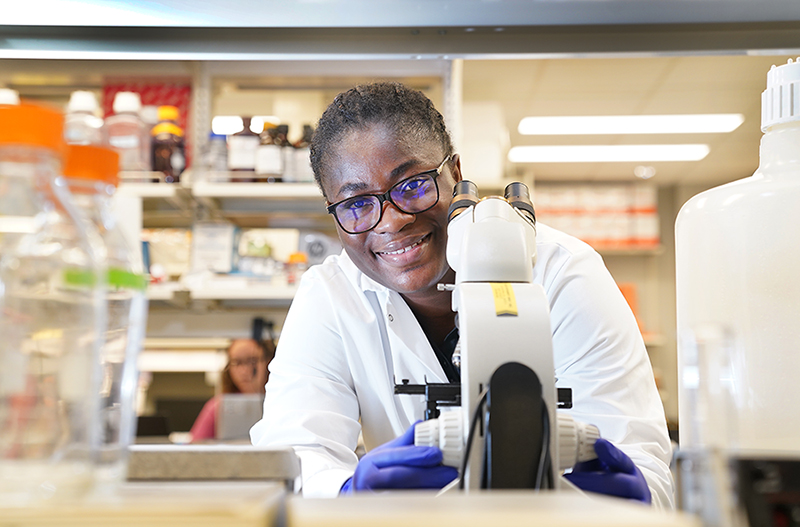Esther Oluwagbenga - Graduate Ag Research Spotlight
It’s just mind-blowing to see how much one can grow in a short time with the right resources and people around you.
- Esther Oluwagbenga, PhD student, Department of Animal Sciences
The student
Esther Oluwagbenga’s home region, Ondo State in southwestern Nigeria, is known for its cocoa crops, mountains and scenic landscapes. Although she grew up in the city of Akure, Oluwagbenga says being surrounded by agriculture fostered her love of science: “I always had this interest in the biology of how bodies function in animals as well as humans.” After earning a bachelor’s degree in animal production and health at the Federal University of Technology Akure, she completed her additional year of compulsory youth service as a graduate assistant at Kwara State University Nigeria, which involved research, teaching and mentoring undergraduates. In searching for a graduate program, “I wanted to do more cutting-edge research, and exposure to different backgrounds and fields,” she says. “I read amazing stuff about Purdue.” Noting that his research interests aligned with her own, she emailed Greg Fraley, Terry and Sandra Tucker Endowed Chair of Poultry Science, and “was just amazed how fast he responded.” She made her first-ever trip to the U.S. to begin a master’s program in Fraley’s lab in May 2021. She defended her thesis in April 2023 and started her PhD in May with Fraley as her advisor. “I love the positive work environment and the research,” she says. “I knew I had to continue this.”
THE RESEARCH
Oluwagbenga’s PhD research focuses on the effect of parent heat stress on the phenotypic alteration of the offspring. It builds on her master’s-level work with breeder Pekin ducks, as she looks for epigenetics modifications in the F0, F1, and F2 generations of ducks exposed to heat stress. “The interesting part is the how maternal environment during pregnancy in mammals or egg formation in poultry can modify gene expression in the offspring with long term effect on the physiology, immunity and behavior,” she says. “A genetic approach has great potential to provide a long-term solution to the effect of climate change on animal production.” Insights into the mechanism of heat stress effect across generations will provide valuable information for improving on-farm management practices, she adds. Identifying biomarkers for higher stress tolerance also may be incorporated into breeding programs to select animals with higher thermotolerance without compromising growth performance and welfare.
opportunities
Oluwagbenga credits Fraley for inclusiveness in his lab, his effort in making her an independent researcher, and facilitating her collaboration with people in the field and industry. She received a 2023 Louja Graduate Travel Award to present at a conference and her department’s 2023 Outstanding M.S. and Early Graduate Career Awards — a feat this introvert says she once couldn’t imagine. “It’s amazing to see how far I‘ve grown as a result of my constant practice, even if it’s out of my comfort zone,” she says. Her research has led to four published articles so far.
future plans
While still early in her PhD program, Oluwagbenga is looking ahead to a postdoctoral position and future in academic research. Outside of the farm and lab, Oluwagbenga enjoys spending time with her husband, whom she married a month before coming to Purdue. “He is here now, and we’re doing life together,” she says. The couple enjoys trying new food and cooking Nigerian recipes, and “I love making pastries and Nigerian cuisines,” she adds.





